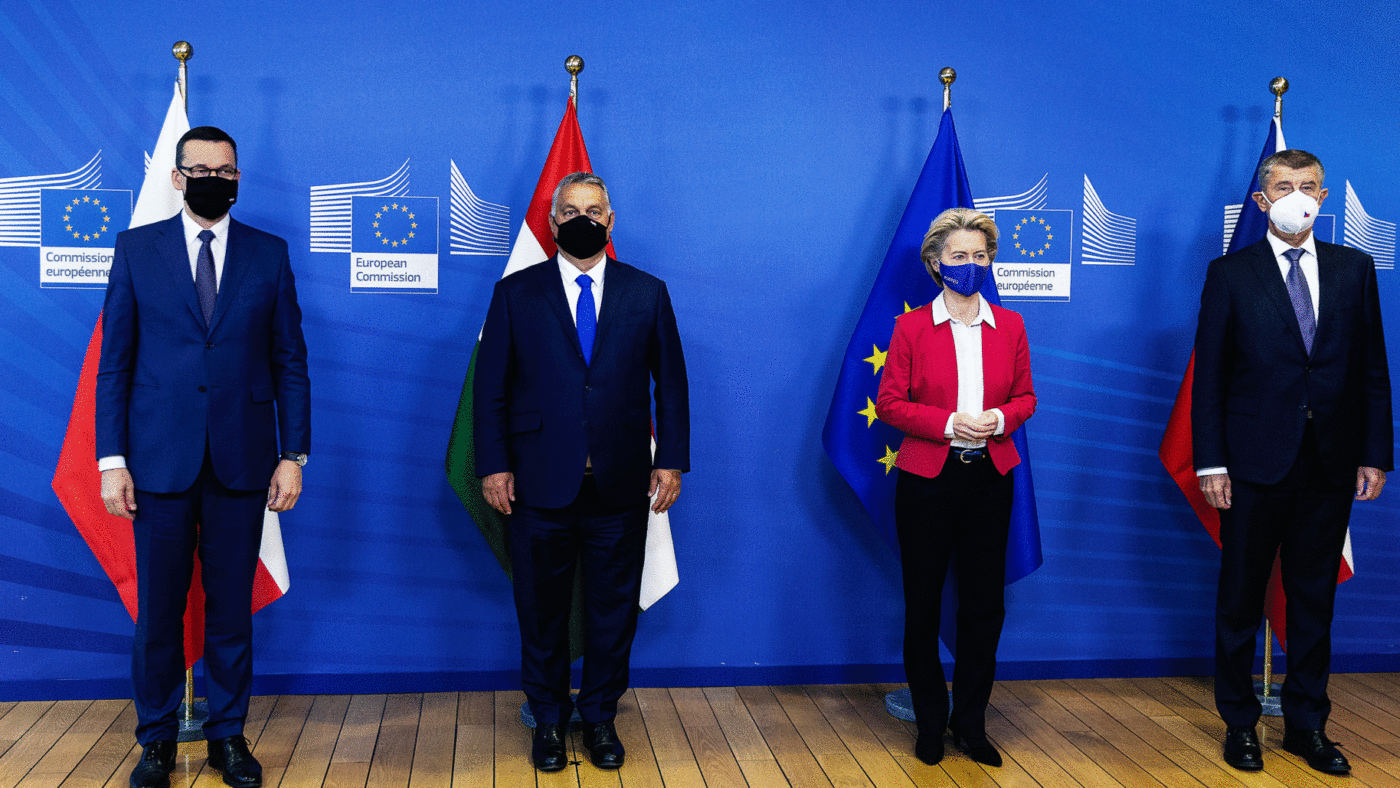Crisis averted! This seemed to have been the general mood in Brussels last week when an agreement on the EU’s economic response to Covid-19 was finally reached. But as deep divisions remain, not just on funding but over the very principles on which the EU was founded, that joy may be premature.
The saga of the Covid recovery fund is just the start. A deal was looking doubtful after Hungary and Poland wielded their veto over a mechanism which would withhold EU funds from member states that are deemed not to uphold the rule of law. Failing to reach an agreement would have left the EU without any money at all from 1 January, and in Brussels there was talk of the other 25 member simply leaving the two naysayers out of the deal.
But at the last minute, all 27 member states reached a compromise which will enable the EU to spend €1.8 trillion over the next seven years – approximately €1.1 trillion as part of the normal budget and an additional €750 billion as part of the recovery package. Hungary and Poland eventually signed up to the deal after the rule of law mechanism was delayed until the European Court of Justice has ruled on its legality – which may take months or years.
Nonetheless, everyone seemed to have been in high spirits after the Council agreement. It is not only the fact that the EU will centrally spend €1.8 trillion in the coming years – an unimaginable amount pre-Corona – but Brussels has also been able to accrue new powers. The €750 billion recovery fund will be financed by a form of debt collectivization where the European Commission for the first time enters financial markets to take on debt for all member states. Similarly, as part of the EU budget, there seems to be new willingness to provide the EU with new opportunities to obtain its “own resources” – code for taxes.
Thus, the coronavirus crisis has enabled an EU power grab. Whether these centralising policies will actually help Europe at-large is a question that was hardly asked in this manic search for new funding.
While Hungary and Poland did eventually sign up, the disagreement between the Brussels bubble and member states in the east goes to the core not only of what the EU ought to do, but what the general vision for Europe should be.
In mainstream EU thinking, the European project has been a massive success – and one which should be ever further intensified. The narrative goes that as well as projecting peace and economic cooperation, the EU has created a community that is open to the world and promoted individual freedom – at least for as long as one buys bananas in the right shape. In the last years, the EU has increasingly been concerned about empowering minorities, even to the detriment of others.
At the same time, however, Eastern European countries like Hungary and Poland have turned away from that vision, with parts of the leadership even rejecting democracy itself. For them, the European project as one of openness, integration, and global utopianism is a threat to the Christian way of life. In their view the task of the state is to enforce and order society according to these principles. This is also the case for the EU itself, which, they argue, was founded on Christian politicians wanting to bring together an explicitly Christian, unified Europe.
As both sides of this debate have turned to new extremes, there have emerged two fundamentally opposite – and irreconcilable – ways of seeing the world. For instance, in November a plan by the European Commission to “promote gender equality and women’s empowerment” was blocked by Hungary and Poland over the term “gender equality”.
Similarly, a new EU strategy on LGTBQ rights has met resistance from the east as threatening the traditional family. In response to more than 80 municipalities in Poland having declared themselves “LGBTQ-free”, the EU has rejected any grant applications from six Polish towns with this status.
Regardless of what one thinks of these different visions, one can only imagine the response from Hungary and Poland if EU funds in general are withheld in the future. Indeed, as these fights have intensified in the last months, the two sides of the debate are on a collision course that will threaten European unity itself.
The EU may cheer for the moment: they will have money – a ton – to spend. But sooner or later, these debates will not be about money anymore, but about what Europeans actually want their societies to be. When it comes to these disagreements, no money will be able to buy someone off.
Click here to subscribe to our daily briefing – the best pieces from CapX and across the web.
CapX depends on the generosity of its readers. If you value what we do, please consider making a donation.


